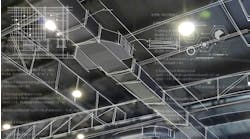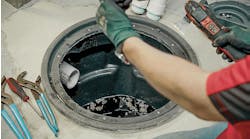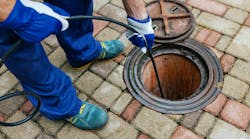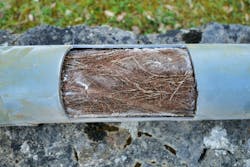Maintaining clean and clear drains is crucial for contractors and their customers, as blockages and clogs can disrupt operations and cause costly downtime. When faced with stubborn or severe drain issues, acid-based drain cleaners can be a valuable tool in a contractor's arsenal. However, it is essential to understand the best practices for their use to ensure safety, prevent damage to plumbing systems, and minimize environmental impact.
This article will explore the appropriate situations for utilizing acid-based drain cleaners, identify when they should be avoided, and delve into the proper techniques and precautions to use them effectively.
What is an Acid-Based Drain Cleaner?
An acid-based drain cleaner is a powerful solution that utilizes concentrated blends of either sulfuric acid or hydrochloric acid to dissolve and remove stubborn blockages in plumbing systems. Sulfuric acid-based cleaners effectively break down organic materials like food, grease, and hair. On the other hand, hydrochloric acid-based cleaners are formulated specifically to tackle inorganic deposits such as mineral build-up, rust, lime, and scale.
Only professionals with the necessary training and understanding of a product’s hazards should be the only ones to use acid-based drain cleaners due to their dangerous nature. Oatey advises that when dealing with complex blockages or uncertainty regarding the appropriate course of action, it is best to avoid using sulfuric acid-based drain cleaners altogether. Instead, we suggest using a snake or other mechanical tool to clear the blockage.
When to Use Acid-Based Drain Cleaners
Contractors should consider utilizing acid-based drain cleaners in the following situations.
1. Commercial or industrial environments
In settings such as restaurants, hotels, or manufacturing facilities, plumbing systems undergo constant, heavy usage and the accumulation of grease, minerals, and other debris. Acid-based drain cleaners are designed to dissolve and break down these stubborn substances quickly and effectively to ensure efficient drainage and the clearing of blockages. One effective drain solvent is Hercules Clobber®, a sulfuric acid-based product formulated for emergency use in clearing drains, sewers, and waste lines. This product rapidly disintegrates paper, rags, food, and all organic matter while inhibiting corrosive action on ferrous and nonferrous metals.
2. Large or complex drainage systems
When dealing with extensive plumbing networks or complex drainage systems, traditional drain cleaning methods may not be sufficient. Acid-based drain cleaners offer a powerful solution for addressing stubborn clogs and blockages in pipes and drains that are challenging to access.
Contractors can also turn to acid-based drain cleaners in response to these common issues:
3. Heavy grease, minerals, or other debris build-up
Acid-based drain cleaners effectively tackle tough blockages caused by the accumulation of substances like grease, minerals, or other debris commonly found in commercial environments. Hercules Sizzle® is a powerful drain solvent that effectively removes scale, salts, mineralized deposits, slime, and corrosion to help clean the drain and prevent future clogs. Sizzle can be safely used with iron, steel, copper, brass, bronze, and lead fixtures to dissolve scale and mineral build-up from water, waste, heating, processing, and air conditioning systems quickly. It also clears plaster, grout, and concrete obstructions from new and old construction.
4. Tree-root intrusion or other mechanical blockages
In situations where tree roots infiltrate plumbing lines or other mechanical blockages, specialty drain cleaners can help dissolve or break down the obstructions, restoring proper flow and preventing costly damage. For example, Hercules® R-D™ Root Destroyer is specifically formulated to eliminate and avoid root growth in sewer-type lines. It contains a special, flake-like formula that prevents and stops root growth in external drain lines. It will not destroy trees, shrubs, or other vegetation and helps prevent sump and ejector pump root damage and motor overload from pumping into restricted lines.
When NOT to Use Acid-Based Drain Cleaners
While acid-based drain cleaners can be highly effective in certain situations, there are instances where alternative methods or specialized handling are more suitable. Contractors should exercise caution and avoid using acid-based drain cleaners in the following scenarios.
When alternative methods are more suitable
When the clog results from solid objects or debris that chemical cleaners cannot dissolve, plumbing technicians often use mechanical snakes or hydro jetting equipment, since they tend to be more effective. These techniques physically remove or break up the blockage, allowing for a more customized and focused method for unclogging the drain.
2. When nonorganic matter causes the blockage
If nonorganic materials such as plastic, metal, or other substances resistant to chemical dissolution cause the blockage, plumbing technicians may require alternative methods or specialized handling.
3. When water is sitting in the fixture
If left on surfaces, even when mixed in with standing water, an etching process will take place and permanently damage the finished surface of the fixture.
Contractors must assess the nature and cause of the blockage before deciding on the appropriate method to clear it. Oatey routinely advises to seek professional advice or thoroughly evaluate the issue to determine whether acid-based drain cleaners are the right choice or if alternative methods should be used for a successful resolution.
Best Practices When Using Drain Cleaners
To ensure safe and effective use of drain cleaners, contractors should follow these best practices.
1. Read and follow the instructions
Different drain cleaners have specific instructions for usage and safety precautions. Carefully read and understand the manufacturer's instructions before using any drain cleaner. Follow the recommended dosage, application method, and safety guidelines to achieve optimal results.
2. Use in well-ventilated areas
Most drain cleaners emit strong fumes that can be harmful when inhaled. To prevent respiratory issues, ensure proper ventilation when using drain cleaners. Open windows or doors and use fans to improve airflow in the area.
3. Wear appropriate protective gear
Always protect yourself when working with drain cleaners. Wear safety goggles or glasses to shield your eyes from potential splashes or fumes. Additionally, use gloves and wear long sleeves to protect your skin from contact with the cleaner. If working in a poorly ventilated area, consider using a mask or respirator to avoid inhaling harmful fumes.
4. Avoid mixing different drain cleaners
Mixing different types or brands of drain cleaners can lead to chemical reactions, causing harmful fumes or even explosions. Stick to using a single product at a time and avoid combining cleaners, especially if they contain different active ingredients.
5. Use appropriate drain cleaners for each type of blockage
As mentioned before, formulators design different acid-based cleaners to address specific types of clogs. Be sure to select one that is appropriate for the particular blockage you are dealing with, whether it be grease, hair, soap scum, or mineral deposits. By using the correct cleaner for the particular problem, you enhance the likelihood of achieving success.
6. Follow up with maintenance
Regular maintenance is key to preventing future clogs. Consider regularly using a maintenance drain cleaner to keep your pipes clean and free-flowing. This preventive measure can help minimize the need for acid-based drain cleaners in the future.
By adhering to these best practices, contractors can effectively and safely use drain cleaners to clear clogs and maintain the optimal performance of plumbing systems. Prioritizing safety, following instructions, and using the appropriate products will yield successful results and protect the integrity of the plumbing infrastructure.
Sean Comerford is the Applications Manager at Oatey Co. He is a third-generation tradesman with nearly 20 years of plumbing experience, including serving as the lead plumber for commercial/residential new construction, service, and fire protection jobs. He holds a State of Ohio Fire Protection License for Sprinkler and Standpipe.



